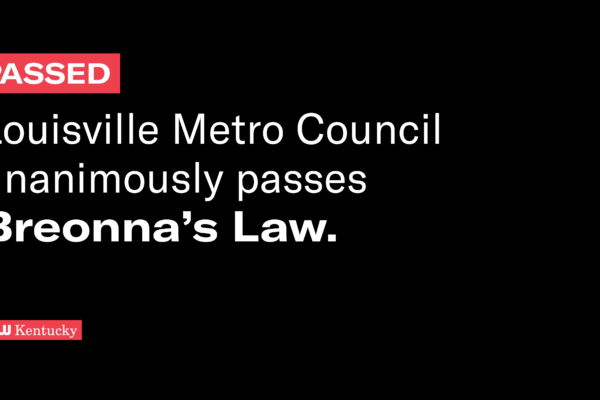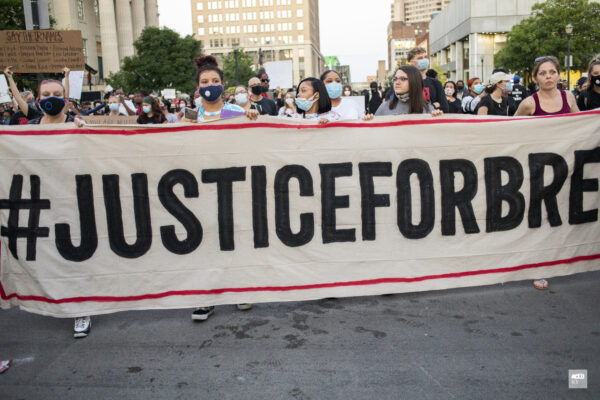If someone pounded on your door and kicked it open in the dark of night, what would you do?
When I learned of the Breonna Taylor case, I tried to put myself in the mind of Kenneth Walker, Taylor’s boyfriend. As police broke through their door in the middle of the night on March 13, 2020, neither knew who was forcibly entering their home. Fearing for their safety, Walker — a licensed gun owner — fired one round as a warning shot, injuring one of the officers entering Taylor’s Louisville home using a “no-knock” warrant.
I was devastated when I listened to Walker’s 911 call and heard him cry, “I don’t know what is happening. Somebody kicked in the door and shot my girlfriend.” Just minutes earlier, the two were watching a movie in bed. As she took her last breaths, Walker remained unaware the people he called for help were the same ones who had just shot his girlfriend.
While Taylor’s death gripped the country, I could not shake the idea of no-knock warrants. They allow armed officers to forcibly enter homes without knocking or announcing themselves. I tried to picture myself resting in bed and then hearing a BANG as my front door swung open. My first inclination would be to defend myself and my family. This is a basic, human response, and the Commonwealth agrees by following the “Castle Doctrine.”
The Castle Doctrine is a state law giving Kentuckians the right to use deadly force to protect themselves, other people, and their property. It justifies force by allowing Kentuckians to assume a person entering their home intends to harm or kill them. The law also relieves people of “duty of retreat,” meaning there is no requirement to avoid conflict at all cost.
No-knock warrants and the Castle Doctrine blatantly contradict each other. Together, they create deadly situations for civilians and law enforcement.
Many states began reexamining no-knock warrants after Louisville Metro Council unanimously passed Breonna’s Law in June 2020, banning no-knock warrants. Most recently, Virginia Governor Ralph Northam signed Breonna’s Law. Breonna Taylor’s mother, Tamika Palmer, said, “Breonna was an EMT and always wanted to save lives. With the passage of Breonna’s Law, she will save lives forever.”
As we begin to reimagine public safety, we must also understand the dark history of no- knock warrants. These deadly warrants originated during the Nixon administration’s failed war on drugs, and have disproportionately been used to target Black and Brown people. In Louisville, courts approved at least 27 no-knock warrants in the two years prior to the ban. A Courier-Journal analysis of 22 of those warrants (several remain sealed by a judge) showed 82% of the listed suspects were Black and 68% were for addresses in the city’s West End, where roughly 81% of residents are a racial or ethnic minority.
The disproportionate targeting of Black and Brown people is not unique to Louisville. In 2014, researchers at the American Civil Liberties Union studied more than 800 SWAT raids nationally. The results of that study:
- Overall, 42 percent of targets were Black and 12 percent were Latino.
- Nearly two-thirds of the raids were for drug searches, and Black and Latino people accounted for 61 percent of drug targets.
- SWAT teams found contraband in only about one third of the drug cases, meaning even if one believes a raid necessary for a drug search, innocent people were placed in life-threatening situations in roughly two out of every three drug raids.
We must look at no-knock warrants through a lens of injustice. These legalized home invasions harm and terrorize Black communities.
It has been nearly 50 years since no-knock warrants were instituted. In this time, people have died, communities have suffered, and many people do not feel safe in their own homes. Now is the time to pass legislation that truly weighs law and justice.
As Louisville Commonwealth Attorney Tom Wine said, “no amount of cocaine or marijuana or other drug or money from the sale of drugs is worth the life of one person, like Breonna Taylor, or a police officer.” The Kentucky General Assembly should pass Breonna’s Law in 2021 and join Virginia, Florida, and Oregon. Passing Breonna’s Law would be a step toward healing, justice, and the preservation of life.




